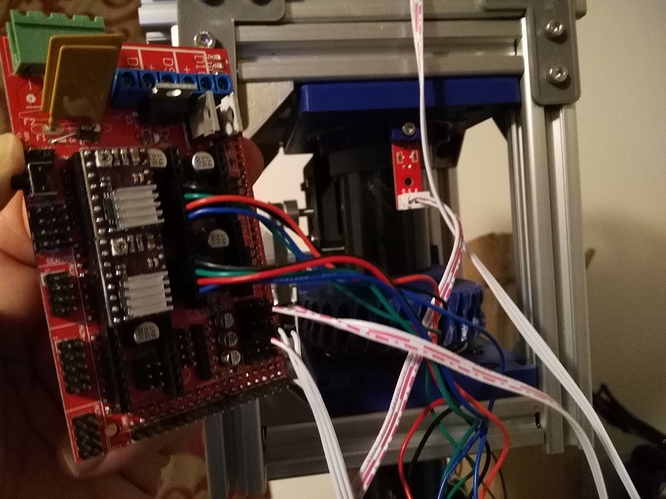EDIT: I think I have it sorted but it’s not disabling the motors after homing and stopping. Is it supposed to do that?
I am trying to get the controller code to work with a RAMPS 1.4 board.
Using this sketch as a reference: http://reprap.org/mediawiki/images/0/0f/RAMPS1.4_TestCode.pde (which runs AZ and EL 200-steps-per-revolution NEMA 17 motors to and fro with correct stepping)
#include <string.h>
#include <stdlib.h>
#include <math.h>
#include <AccelStepper.h>
#define DIR_AZ 55 /*PIN for Azimuth Direction*/
#define STEP_AZ 54 /*PIN for Azimuth Steps*/
#define DIR_EL 61 /*PIN for Elevation Direction*/
#define STEP_EL 60 /*PIN for Elevation Steps*/
/*
#define X_STEP_PIN 54
#define X_DIR_PIN 55
#define X_ENABLE_PIN 38
#define X_MIN_PIN 3
#define X_MAX_PIN 2
#define Y_STEP_PIN 60
#define Y_DIR_PIN 61
#define Y_ENABLE_PIN 56
#define Y_MIN_PIN 14
#define Y_MAX_PIN 15
*/
#define EN_AZ 38 /*PIN for Enable or Disable Stepper Motors*/
#define EN_EL 56 /*PIN for Enable or Disable Stepper Motors*/
#define SPR 200 /*Step Per Revolution*/
#define RATIO 60 /*Gear ratio*/
#define T_DELAY 60000 /*Time to disable the motors in millisecond*/
#define HOME_AZ 2 /*Homing switch for Azimuth*/
#define HOME_EL 15 /*Homing switch for Elevation*/
#define MAX_AZ_ANGLE 365 /*Maximum Angle of Azimuth for homing scanning*/
#define MAX_EL_ANGLE 365 /*Maximum Angle of Elevation for homing scanning*/
#define MAX_SPEED 300
#define MAX_ACCELERATION 100
#define MIN_PULSE_WIDTH 20 /*in microsecond*/
#define DEFAULT_HOME_STATE HIGH /*Change to LOW according to Home sensor*/
#define HOME_DELAY 6000 /*Time for homing Decceleration in millisecond*/
#define BufferSize 256
#define BaudRate 19200
/*Global Variables*/
unsigned long t_DIS = 0; /*time to disable the Motors*/
/*Define a stepper and the pins it will use*/
AccelStepper AZstepper(1, STEP_AZ, DIR_AZ);
AccelStepper ELstepper(1, STEP_EL, DIR_EL);
void setup()
{
/*Change these to suit your stepper if you want*/
AZstepper.setMaxSpeed(MAX_SPEED);
AZstepper.setAcceleration(MAX_ACCELERATION);
/*Change these to suit your stepper if you want*/
ELstepper.setMaxSpeed(MAX_SPEED);
ELstepper.setAcceleration(MAX_ACCELERATION);
/*Set minimum pulse width*/
AZstepper.setMinPulseWidth(MIN_PULSE_WIDTH);
ELstepper.setMinPulseWidth(MIN_PULSE_WIDTH);
/*Enable Motors*/
pinMode(EN_AZ, OUTPUT);pinMode(EN_EL, OUTPUT);
digitalWrite(EN_AZ, LOW);digitalWrite(EN_EL, LOW);
/*Homing switch*/
pinMode(HOME_AZ, INPUT_PULLUP);
pinMode(HOME_EL, INPUT_PULLUP);
/*Serial Communication*/
Serial.begin(BaudRate);
/*Initial Homing*/
Homing(deg2step(-MAX_AZ_ANGLE), deg2step(-MAX_EL_ANGLE));
}
void loop()
{
/*Define the steps*/
static int AZstep = 0;
static int ELstep = 0;
/*Time Check*/
if (t_DIS == 0)
t_DIS = millis();
/*Disable Motors*/
if (AZstep == AZstepper.currentPosition() && ELstep == ELstepper.currentPosition() && millis()-t_DIS > T_DELAY) {
digitalWrite(EN_AZ, HIGH);
digitalWrite(EN_EL, HIGH);
} else {
digitalWrite(EN_AZ, LOW);
digitalWrite(EN_EL, LOW);
}
/*Read the steps from serial*/
cmd_proc(AZstep, ELstep);
/*Move the Azimuth & Elevation Motor*/
stepper_move(AZstep, ELstep);
}
/*Homing Function*/
void Homing(int AZsteps, int ELsteps)
{
int value_Home_AZ = DEFAULT_HOME_STATE;
int value_Home_EL = DEFAULT_HOME_STATE;
boolean isHome_AZ = false;
boolean isHome_EL = false;
AZstepper.moveTo(AZsteps);
ELstepper.moveTo(ELsteps);
while(isHome_AZ == false || isHome_EL == false)
{
value_Home_AZ = digitalRead(HOME_AZ);
value_Home_EL = digitalRead(HOME_EL);
/*Change to LOW according to Home sensor*/
if (value_Home_AZ == DEFAULT_HOME_STATE)
{
AZstepper.moveTo(AZstepper.currentPosition());
isHome_AZ = true;
}
/*Change to LOW according to Home sensor*/
if (value_Home_EL == DEFAULT_HOME_STATE)
{
ELstepper.moveTo(ELstepper.currentPosition());
isHome_EL = true;
}
if (AZstepper.distanceToGo() == 0 && !isHome_AZ)
{
error(0);
break;
}
if (ELstepper.distanceToGo() == 0 && !isHome_EL)
{
error(1);
break;
}
AZstepper.run();
ELstepper.run();
}
/*Delay to Deccelerate*/
long time = millis();
while(millis() - time < HOME_DELAY)
{
AZstepper.run();
ELstepper.run();
}
/*Reset the steps*/
AZstepper.setCurrentPosition(0);
ELstepper.setCurrentPosition(0);
}
/*EasyComm 2 Protocol & Calculate the steps*/
void cmd_proc(int &stepAz, int &stepEl)
{
/*Serial*/
char buffer[BufferSize];
char incomingByte;
char *Data = buffer;
char *rawData;
static int BufferCnt = 0;
char data[100];
double angleAz, angleEl;
/*Read from serial*/
while (Serial.available() > 0)
{
incomingByte = Serial.read();
/* XXX: Get position using custom and test code */
if (incomingByte == '!')
{
/*Get position*/
Serial.print("TM");
Serial.print(1);
Serial.print(" ");
Serial.print("AZ");
Serial.print(10*step2deg(AZstepper.currentPosition()), 1);
Serial.print(" ");
Serial.print("EL");
Serial.println(10*step2deg(ELstepper.currentPosition()), 1);
}
/*new data*/
else if (incomingByte == '\n')
{
buffer[BufferCnt] = 0;
if (buffer[0] == 'A' && buffer[1] == 'Z')
{
if (buffer[2] == ' ' && buffer[3] == 'E' && buffer[4] == 'L')
{
/*Get position*/
Serial.print("AZ");
Serial.print(step2deg(AZstepper.currentPosition()), 1);
Serial.print(" ");
Serial.print("EL");
Serial.print(step2deg(ELstepper.currentPosition()), 1);
Serial.println(" ");
}
else
{
/*Get the absolute value of angle*/
rawData = strtok_r(Data, " " , &Data);
strncpy(data, rawData+2, 10);
if (isNumber(data))
{
angleAz = atof(data);
/*Calculate the steps*/
stepAz = deg2step(angleAz);
}
/*Get the absolute value of angle*/
rawData = strtok_r(Data, " " , &Data);
if (rawData[0] == 'E' && rawData[1] == 'L')
{
strncpy(data, rawData+2, 10);
if (isNumber(data))
{
angleEl = atof(data);
/*Calculate the steps*/
stepEl = deg2step(angleEl);
}
}
}
}
/*Stop Moving*/
else if (buffer[0] == 'S' && buffer[1] == 'A' && buffer[2] == ' ' && buffer[3] == 'S' && buffer[4] == 'E')
{
/*Get position*/
Serial.print("AZ");
Serial.print(step2deg(AZstepper.currentPosition()), 1);
Serial.print(" ");
Serial.print("EL");
Serial.println(step2deg(ELstepper.currentPosition()), 1);
stepAz = AZstepper.currentPosition();
stepEl = ELstepper.currentPosition();
}
/*Reset the rotator*/
else if (buffer[0] == 'R' && buffer[1] == 'E' && buffer[2] == 'S' && buffer[3] == 'E' && buffer[4] == 'T')
{
/*Get position*/
Serial.print("AZ");
Serial.print(step2deg(AZstepper.currentPosition()), 1);
Serial.print(" ");
Serial.print("EL");
Serial.println(step2deg(ELstepper.currentPosition()), 1);
/*Move the steppers to initial position*/
Homing(deg2step(-MAX_AZ_ANGLE), deg2step(-MAX_EL_ANGLE));
/*Zero the steps*/
stepAz = 0;
stepEl = 0;
}
BufferCnt = 0;
/*Reset the disable motor time*/
t_DIS = 0;
}
/*Fill the buffer with incoming data*/
else {
buffer[BufferCnt] = incomingByte;
BufferCnt++;
}
}
}
/*Error Handling*/
void error(int num_error)
{
switch (num_error)
{
/*Azimuth error*/
case (0):
while(1)
{
Serial.println("AL001");
delay(100);
}
/*Elevation error*/
case (1):
while(1)
{
Serial.println("AL002");
delay(100);
}
default:
while(1)
{
Serial.println("AL000");
delay(100);
}
}
}
/*Send pulses to stepper motor drivers*/
void stepper_move(int stepAz, int stepEl)
{
AZstepper.moveTo(stepAz);
ELstepper.moveTo(stepEl);
AZstepper.run();
ELstepper.run();
}
/*Convert degrees to steps*/
int deg2step(double deg)
{
return(RATIO*SPR*deg/360);
}
/*Convert steps to degrees*/
double step2deg(int Step)
{
return(360.00*Step/(SPR*RATIO));
}
/*Check if is argument in number*/
boolean isNumber(char *input)
{
for (int i = 0; input[i] != '\0'; i++)
{
if (isalpha(input[i]))
return false;
}
return true;
}